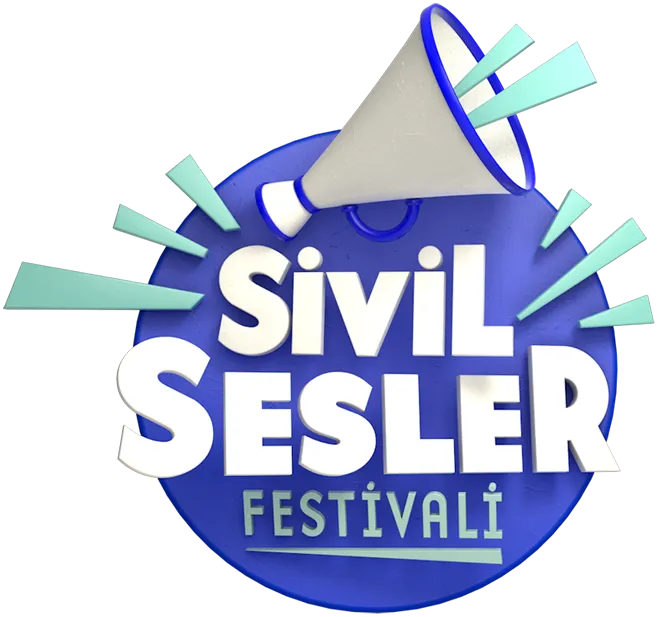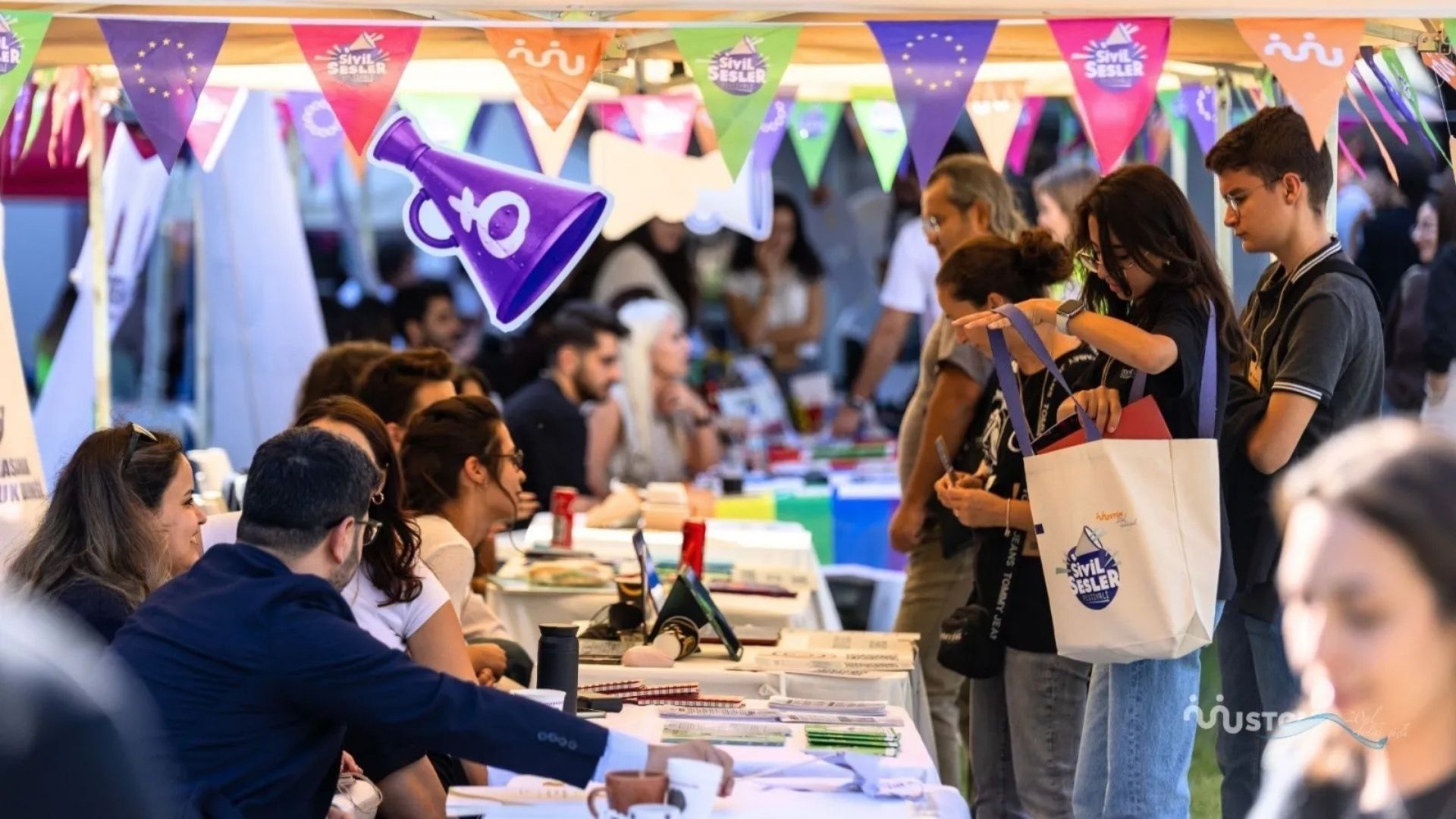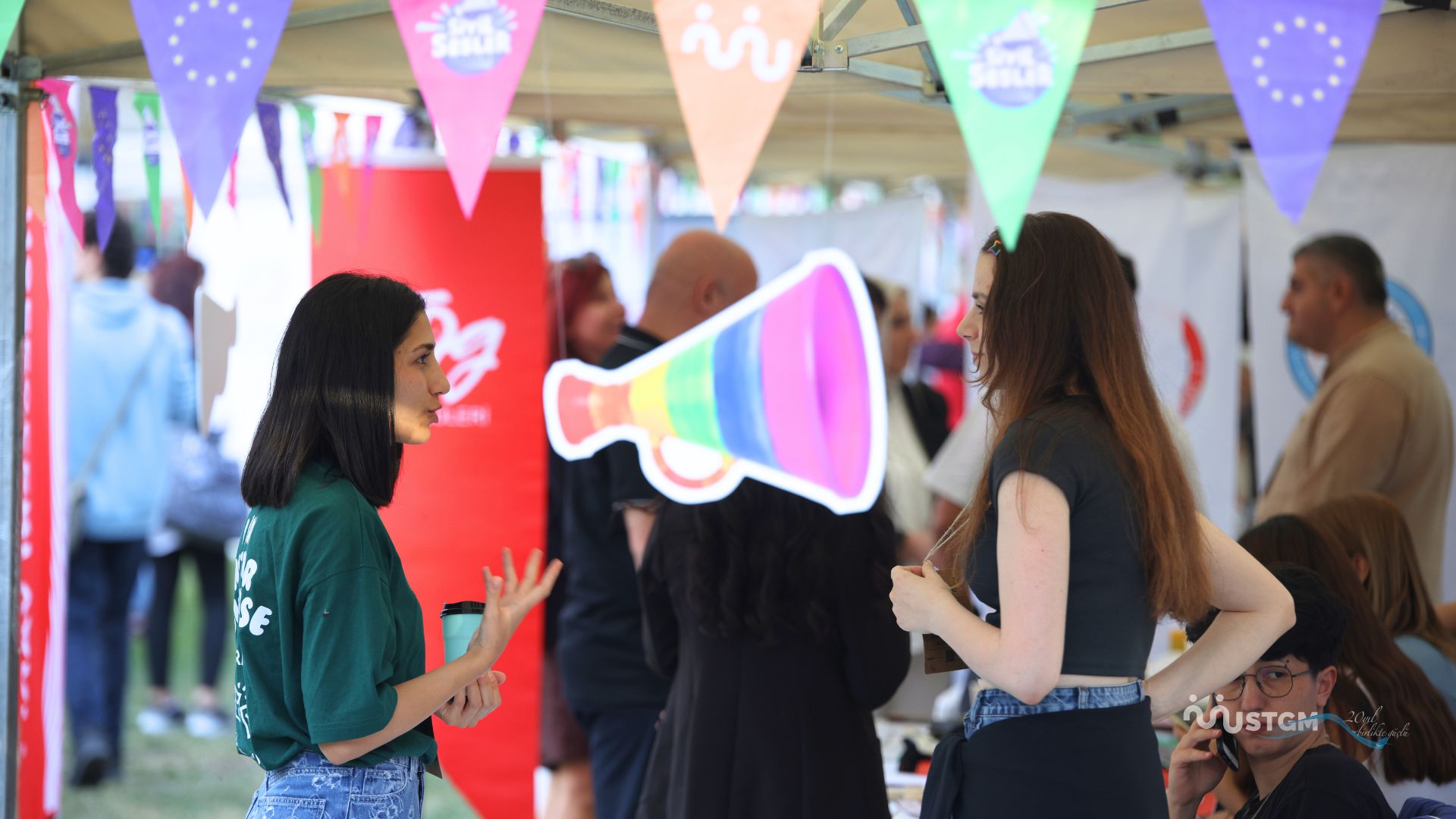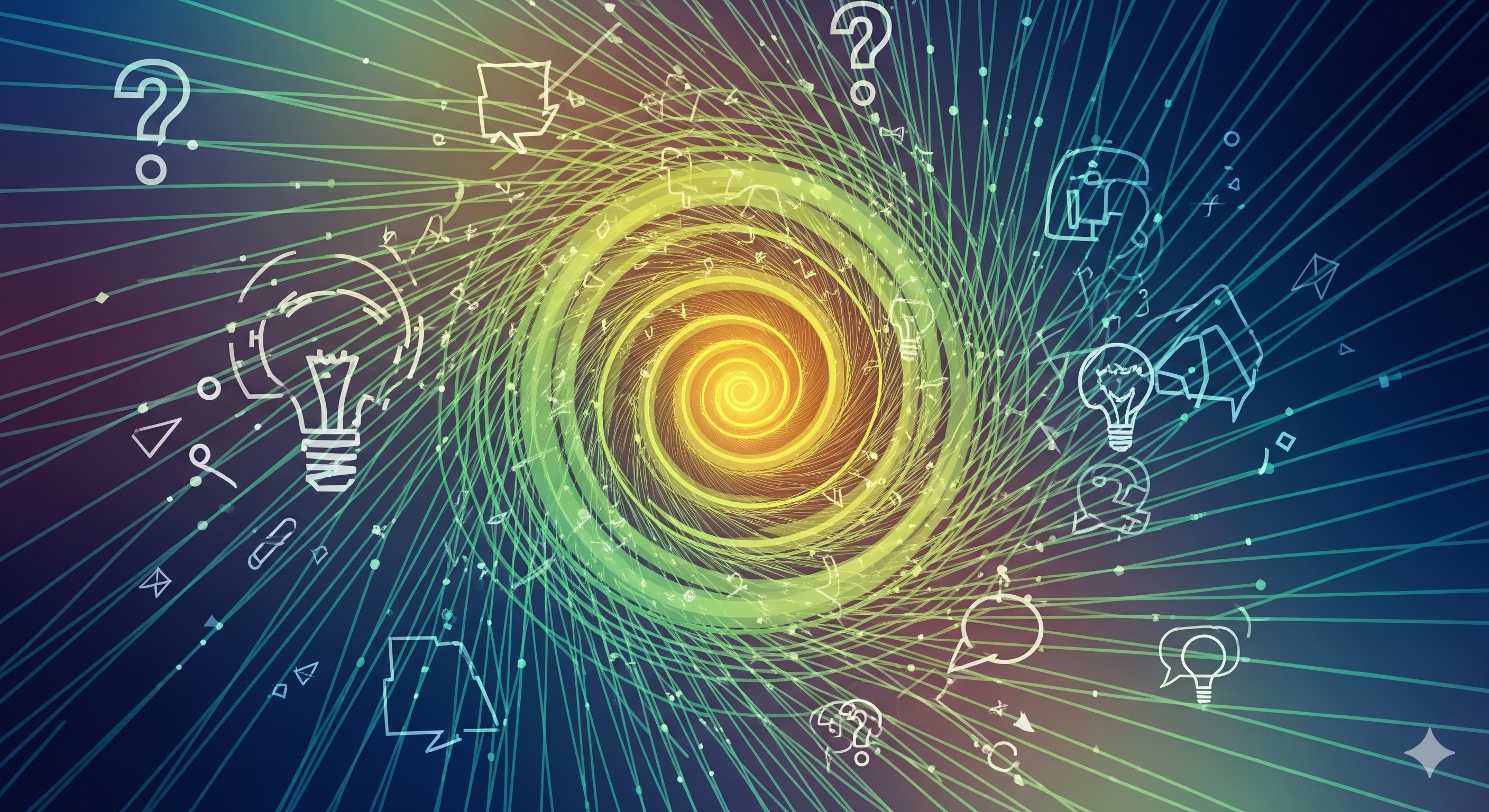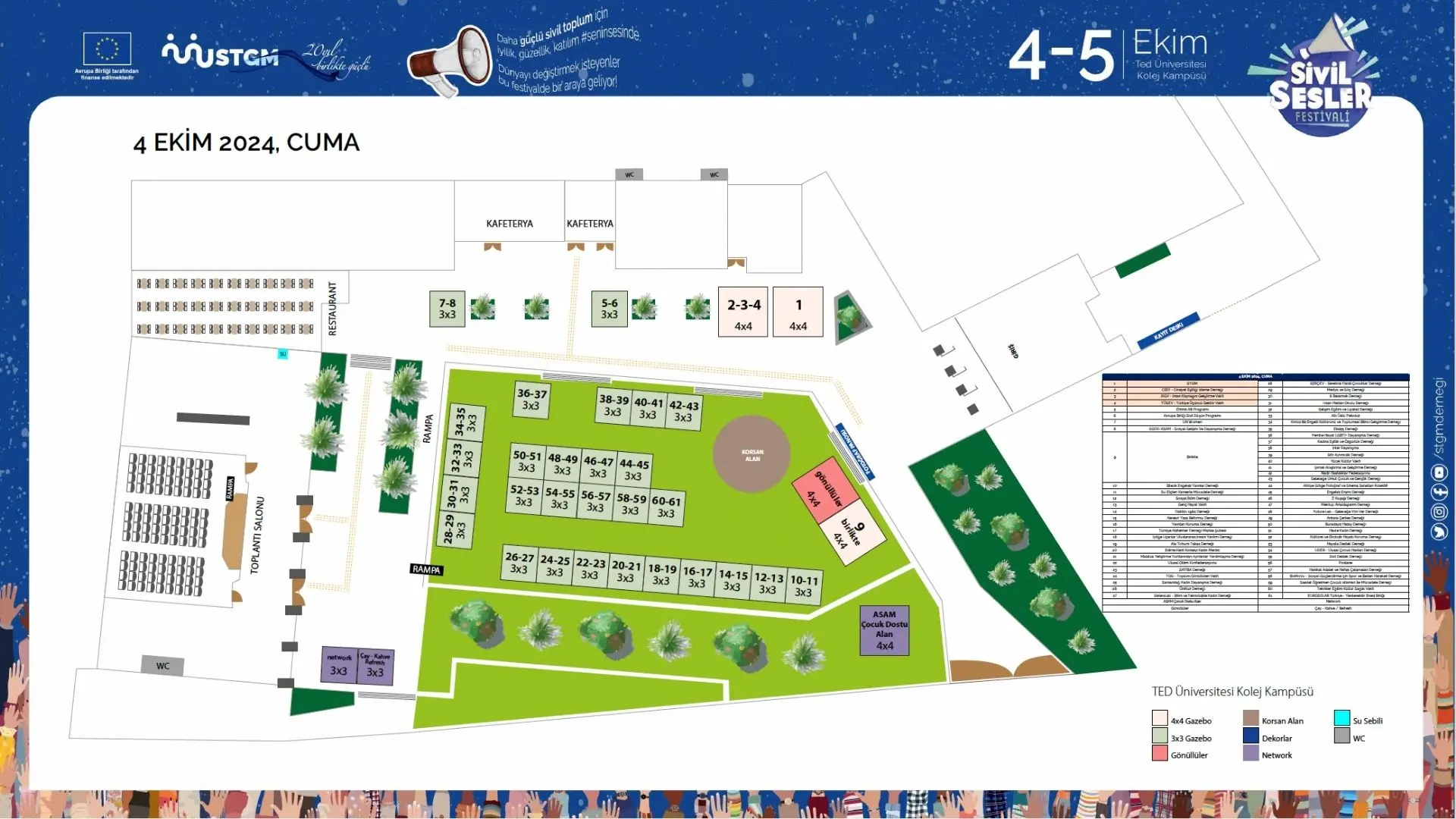One of our most essential instruments to show that our differences are a richness, and that they can live together, is our voices. Civil Voices Festival is a polyphonic choir where civil society organizations from diverse fields come together to share their experiences, knowledge, work, and dreams.
As one of the first events bringing together Türkiye’s civil society actors, the festival offers a space where civil society actors meet, discuss, and imagine what can be done for a better world. The festival is organized by STGM.
At Civil Voices Festival, civil society organizations working in different cities and across different thematic fields can showcase their work at stands, while also participating in workshops, panels, forums, and talks. This creates opportunities to get to know each other, discuss areas of work, and explore possibilities for collaboration.
The first Civil Voices Festival was held in 2009 at Küçükçiftlik Park in Istanbul. For two days, nearly a hundred organizations working in areas ranging from children’s rights to disability rights, youth rights to refugee rights, women’s rights to environmental rights gathered together.
After a two-year break, the second festival took place in July 2011 in Ankara, this time under the theme “No Civil Constitution Without Us”, focusing on the constitutional reform agenda. More than 100 civil society organizations from across Türkiye came together to prepare demands for an egalitarian, libertarian, pluralistic, and ecological constitution, calling on lawmakers to act.
The third festival, in May 2014, was held under the shadow of the Soma mine disaster. Organized as a forum, it was designed to discuss the “limits of freedom” through the lens of the right to life.
Although Civil Voices was intended to be a regular event from the beginning, due to various reasons it has been held irregularly. The most recent gathering before the pandemic took place in 2019 in Istanbul, where representatives of civil society organizations from across Türkiye came together to discuss the changes civil society had created over the years.
After a three-year break — mainly due to the pandemic — we held the fifth festival in October 2022 in Ankara under the slogan “If We Want Change, We Must Be Strong.” We welcomed over 600 civil society representatives from 58 cities across Türkiye.
The sixth festival was held on 17–18 November 2023 in İzmir Kültürpark under the motto “Solidarity Strengthens,” following the devastating February earthquakes. More than 200 organizations working in different rights fields came together to share how they tackled crises and their post-earthquake work in a series of sessions.
Most recently, in 2024, we gathered once again for the seventh festival, on 4–5 October at TED University in Ankara. With more than a thousand participants, the festival brought together all the voices and colors of civil society, as organizations showcased their work at stands and joined workshops on a wide variety of topics.
Festival Program
The program for the 7th Civil Voices Festival is now live! This year’s festival will once again bring together civil society organizations from across Turkey, working in diverse fields of rights. Don’t forget to check out the program and mark your notes
Events
Many events await you at the festival this year!
STGM, TUSEV and TACSO regularly publish monitoring reports on the current state of freedom of association in Turkey.
In this session, the findings of the report “Civil Society Organisations in Türkiye: Freedom of Association and the Right to Participation” by STGM, “Monitoring Matrix on Enabling Environment for Civil Society 2020-2021 Turkey Report" by TUSEV and “European Commission Directorate General for Neighbourhood and Enlargement Negotiations (DG NEAR) Guidelines for EU Support to Civil Society in Enlargement Countries (2021-2027), Baseline Assessment Report 2023, Turkey Country Report” by TACSO will be presented. The session will provide participants with the opportunity to compare and discuss the developments in the field of organization in our country, the current situation and proposed solutions.
This workshop will be organized with a perspective that combines data and gender.
Topics such as what data means, elements that fall into the definition of data, and connections between data and inequality will be discussed. Discussions about gender equality will be held in the workshop where gender-sensitive data collection and analysis methods will be examined.
A maximum of 30 people can participate.
We will reflect together on the overlaps and similarities between animal rights violations and other areas of law that have recently been put on the agenda with the amendments to the Animal Protection Law. We will create a map of otherness together.
While running around, we sometimes get out of breath, sometimes our body gets stiff. This little work will be a maintenance and repair for "ourselves" and "our bodies". Let's all move those stiff parts of our body, our back, our shoulders, our neck, calmly and gently. Some of the movements will be done standing up, some sitting down. You don't need any special equipment, just bring yourself.
ENÇOKK box and mobile game was developed within the scope of the EU-supported project "Effective Participation of Disabled Children in Decision-Making Processes" to help disabled and non-disabled children learn about the rights of disabled people through games.
The game, designed for children between the ages of 11 and 18, was aimed at being as accessible as possible for disabled children. With this event, the aim is to introduce and disseminate the game to human rights activists and CSOs that work with/can reach children.
A maximum of 20 people can participate.
In Power Stories, we hear first-hand the organisational stories of people from very different parts of Turkey who have faced various problems and who have turned this ordeal into a struggle to open a service/healing space in the social sector. In this workshop, we will talk about solidarity, getting stronger, not giving up and what real power is in the difficulties we face through human conditions with our 4 storytellers.
Whose stories will we listen to?
Mustafa Alper Ülgen (A Seed Foundation): Mustafa Alper Ülgen was born in Urfa, spent his childhood in Elazığ and Diyarbakır, but has always lived away from his land, worked in different geographies from Van to Aydın, and settled in Çanakkale when he put permaculture and ecology at the centre of his life. He is a farmer who produces ancestral seeds, local wheat varieties, a cook who works on local flavours, and an environmental activist who fights against mining plunder in the Kazdağları region.
Gizem Öykü Başkaya (Izmir Bar Association Immigration and Asylum Commission): A woman on the road to Ithaca, a human rights advocate, lawyer, climber, dancer, and runner; she is defined by what she aspires to be, what she has given up, what she clings to, and what she lets go of—among many other things, and many things she is not. In pursuit of stories, she continues her journey through the cracks opened on earth, finding a secret in every story and a journey in every secret.
Ayça Yaltı (Diverse Minds): Ayça Yaltı is an academic who studied at the Faculty of Law. With the intention of doing justice to her states of being, she took it upon herself to explore herself first and foremost. The things that had accumulated in her as she came to know her own differences along the way slowly came out of his mouth after a long time. Since that day, she has been healing herself by sharing her own experiences with her troublemakers, as much as she can sort out from the fairground in her head.
Eray Özgüner (Burak Ozguner Animal Rights Study Center): In the days when death and loss suddenly knocked on her door and touched her life, she listened to the call from within, "mother!" and became an activist. While defending animal rights, she became courageous, stronger, and multiplied with love. A traveler of heart who works to improve the lives of all living beings, regardless of species.
As Türkiye’s first and only rights-focused film platform, CAM hosts nearly 200 productions that touch on various rights issues. The platform creates a vibrant space that both highlights the importance of film production for the benefit of rights and raises awareness about these issues.
With the rights-focused film workshop at CAM we will discuss and practice how films can empower rights and how we can create films that advocate for them.
- How is the rights advocacy narrative woven?
- How is the story of rights written? What can make the story powerful?
- What are the ways of putting rights on the agenda through films?
- What can be effective ways to reach the audience and encourage them to protect rights?
In the workshop, excerpts from CAM films will be shown and the above questions will be answered together with the lecturer of the Faculty of Communication, Cinema and Television of Anadolu University, Prof. Nezih Orhon.
Are you ready to discover the power of nonviolent organization? In this workshop, you will learn what nonviolent organization is and get information about how we can develop a nonviolent approach structurally, culturally and intellectually in our organizations. A maximum of 15 people can participate.
On February 6, what did we experience that night and the next day or what happened during the early hours of the following day, and what did we do immediately afterward? An impromptu performance will also be performed at this gathering, where Teatro Ayntab will tell the story of the movement called "Art is Everywhere", which was started completely voluntarily after the earthquake.
We, as civil society organizations, regularly organize events. However, are we ensuring that our events reach their target audience, promoting diversity and inclusivity, and facilitating the participation of all stakeholders, while also addressing potential barriers? In this workshop, we will discuss many details related to disabilities and accessibility, gender-sensitive activities, child safety, and other logistical issues that we may be unaware of, have forgotten, or lack knowledge about.
The February 6 Earthquakes confronted us with a major disaster that our country had not previously experienced. While the country was going through its darkest days in history, it was solidarity that kept us all afloat. In this workshop, you will hear the story of organizations that have come together in different ways to support each other.
Lotus Women's Association has been working since February to identify and provide for the special needs of women. From the first day of the disaster, Lotus Women, who have been working in the field, continue to empower women's lives with innovative approaches according to the needs of the field.
During the early days of the earthquake, transportation became one of the most important issues in the disaster-stricken areas, and motorcycle couriers quickly delivered aid to even the most difficult-to-reach areas. In this session, the Courier Rights Association will share the experiences of motorcycle couriers who have gone to earthquake-stricken areas with their motorcycles and their plans and recommendations on how motorcycle couriers can prepare for possible earthquakes.
Defne Women's Cooperative is one of the organizations that survived the disaster by clinging to production. Defne Women’s Cooperative, who say, “We learned the word ‘solidarity’ through experience rather than discourse,”will tell the story of how they started holding on to life together by producing, and will talk about the unifying power of production.
The workshop, which will talk about the right to cultural production in the mother tongue, will focus on freedom of expression in the mother tongue, which represents the right of individuals to create art, literature, music and more in their own language. A maximum of 15 people can participate.
The workshop will discuss the concept of 'Antigypsyism', which is a specific type of discrimination that is conceptually little known and often ignored. A presentation will be made on what antigypsyism means and why such a special definition of discrimination is needed. In the workshop, questions associated with Antigypsyism such as "Gypsy or Romani" will be discussed and examples of Antigypsyism that we encounter in daily life will be examined. A maximum of 20 people can participate.
The Council of Europe Committee of Municipalities and Regions Charter for Equality of Women and Men in Local Life is a Charter that municipalities can directly become a party to.The most important aspect of this is that municipalities that are party to the Charter are obliged to prepare and implement local equality action plans.
The developments that the Turkish women's movement has made in this area have been carried out at local level and have been integrated at national level. With the idea that this development can also contribute to various local action plans that civil society will prepare with a rights-based approach, this process will be discussed with the participants of the event.
In Turkey, the increasing anti-LGBTI+ policies and climate of hatred call for solidarity, mutual learning, and the development of LGBTI+ inclusive practices. In this workshop, discussions will revolve around what civil society organizations can do to support LGBTI+ individuals, and together, we will explore the possibilities of solidarity and empowerment.
Institutional grants and support for institutional development aim to ensure the sustainability of organisations. However, the implementation of these supports is not independent of external conditions.
We will discuss the impact of these external conditions, which sometimes become difficult and overlap with crises, on work processes and tactics to reduce this impact.
In Power Stories, we hear first-hand the organisational stories of people from very different parts of Turkey who have faced various problems and who have turned this ordeal into a struggle to open a service/healing space in the social sector. In this workshop, we will talk about solidarity, getting stronger, not giving up and what real power is in the difficulties we face through human conditions with our 4 storytellers.
Power storytellers will bring together inspiring stories with curiosity, care and great excitement, from the organization of couriers to those who touch the right to life of children in hospitals; from the invisible labor of women at home to how difficult obstacles can create a courageous rights defender.
Mesut Çeki(Courier Rights Association): During the pandemic, he bought a motorcycle and became a courier, first delivering flowers and food, then countless items ranging from documents to dental products, spare parts to wedding dresses. He covered more than 150 thousand kilometers in three years. When he entered thousands of streets and witnessed thousands of moods and faces of people, he realized that he was in the middle of a communication and solidarity network story in which tens of thousands of couriers were a part. If he doesn't tell you his story, his tongue will swell...:)
Özlem Arman(Let's Be Happy Project): In her "Let's Be Happy" project, which she has been implementing for 23 years in İzmir, she organizes various activities for children who are hospitalized in state and university hospitals to ensure they are healthy not only physically but also mentally. She does this with her team of volunteers and meets the needs of both children and their families.
Nimet Sarıkaya(Association of the Hearing Impaired with Bionic Ears): While she was a mother thinking about what she could do for her child in his struggle for silence, along the way she touched the lives of all the special children and individuals who said "Mother, Hear my voice!" in the civil area in Kütahya. She advocates for the rights of children and the disabled and works to ensure that disadvantaged groups in society and social sectors can say: "We exist too!"
Derya Altay: A heart traveler... In order to get to know herself, she clings to the red thread of stories and wanders from one land to another, offering the pearls of truth she finds about life to the pockets of those who listen to her stories. Her favorite thing to do in life is to share her experiences of reality.
In this workshop, which offers the opportunity to introduce Laz language and Laz culture, the origins of Laz language, how it has evolved from past to present and why it is in danger will be explained. A maximum of 30 people can participate.
In the workshop, which will be organized with the support of the game book compiled by Zafer S. Yılmaz, information will be given about ice breaking and team building games that will increase group dynamics during meetings and events. While explaining how to use these games, we will of course play games.
In the session where the support provided by the EU to civil society will be discussed, information will first be provided on the programming process of EU financial aid. Then, it will be explained how the EU’s support to civil society in the Western Balkans is programmed and implemented. Good practice examples will also be shared in this session.
In the session where how civil society participation in the EU negotiation process can be increased will be discussed, the problems experienced by the participants in the projects implemented within the scope of the support provided by the EU to civil society, solution suggestions and project ideas will also be discussed. The outputs of the session, in which the active contribution of the participants is expected, will be shared
In this workshop, we will discuss how the effects of past crises in Turkey and possible crisis scenarios can impact children and caregivers. We will focus on the unique needs of children during crisis periods, child-centered approaches to meet these needs, and how collaboration networks can be established. A maximum of 20 people can participate.
If you want to creatively design your posts, banners and videos for social media, you are invited to the Canva workshop.
Canva is a graphic design platform that provides tools for creating social media graphics, presentations, promotional merchandise and websites. Its offerings include templates for presentations, posters, and social media content, as well as functionalities for photo and video editing. In this workshop you will have more detailed information about CANVA.
The workshop titled "Embroidering Memory", where the past and present will be combined by touching photographs, offers a different perspective on the art of photography. Using black and white photographs as the main material, the focus will be on the life, places and people of the past period. In the workshop, original works of art will be created by manipulating photographs with needles and threads.
Embroidering Memory Workshop offers a great opportunity to learn a new technique as well as strengthen solidarity, collective production and the bond between past and present.
A maximum of 20 people can participate.
Festival Venue
TED University
Ziya Gökalp Street, No: 48
06420, Kolej, Çankaya ANKARA
